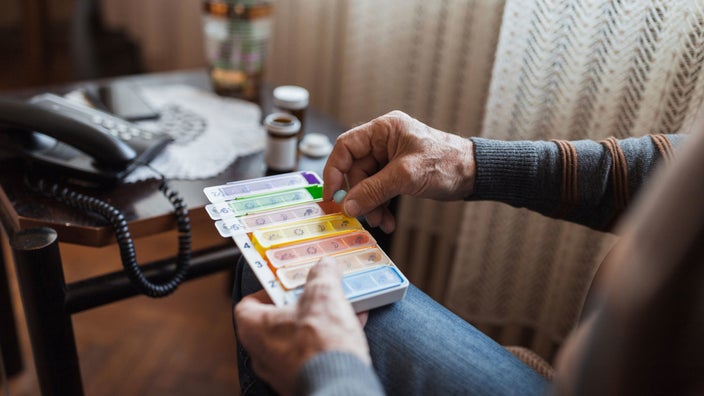
8 Meclizine Interactions You Should Know About
Key takeaways:
Meclizine (Bonine) is an antihistamine. It’s an over-the-counter medication used to treat or prevent symptoms of motion sickness. Meclizine (Antivert) also comes as a prescription product to treat vertigo.
Meclizine interacts with many medications. Common examples include medications that make you feel drowsy, other antihistamines, and anticholinergics.
Talk to your healthcare provider or pharmacist before starting new medications. They can help you avoid or manage potential interactions with meclizine.
Access savings on related medications

If you’ve ever had motion sickness, you might have grabbed some meclizine (Bonine) off the pharmacy shelves to help. Meclizine also comes as a prescription product called Antivert, which can be used for vertigo (spinning sensation) in adults.
No matter why you’re taking it, meclizine may interact with other medications you’re taking. Most times, this is because it causes drowsiness. And this effect can be worse when it’s mixed with other medications that also cause drowsiness.
Over-the-counter (OTC) meclizine goes by a few names, including Bonine and Dramamine Less Drowsy. But before making your purchase, check with your pharmacist about meclizine interactions. Here, we’ll review a few important ones to know.
1. Sleep medications
Many sleep medications are available OTC and with a prescription. OTC sleep aids often contain first-generation antihistamines, such as diphenhydramine (ZzzQuil) and doxylamine (Unisom SleepTabs).
Meclizine is also a first-generation antihistamine. This group of medications share side effects, like drowsiness, dizziness, and dry mouth. Combining them with meclizine can worsen these effects.
Examples of prescription sleep medications include zolpidem (Ambien), eszopiclone (Lunesta), and ramelteon (Rozerem). Since they’re intended to help you sleep, it’s not too surprising that they all cause drowsiness. When taken with meclizine, this combination could lead to falls, unsafe driving, and injuries.
Talk to your healthcare provider about how to manage this interaction. If you're taking meclizine once a day, you may be able to space out your dosing to avoid an interaction. But this might not be an option if you’re taking it several times a day.
2. Benzodiazepines
Benzodiazepines (BZDs) are medications that help you relax. They’re used to treat many different conditions, including anxiety. Some are also used for seizures, sleep, and alcohol withdrawal. BZDs are considered controlled substances. A few examples include alprazolam (Xanax), clonazepam (Klonopin), temazepam (Restoril).
Some of meclizine’s side effects overlap with those of BZDs. Examples include drowsiness, headache, and vomiting. If meclizine is taken with a BZD, these side effects may intensify. In severe cases, your breathing may slow down too much.
Some people take BZDs as needed, while others take them every day. Similarly, you might be taking meclizine once or multiple times a day. So, depending on how you take your medications, this interaction may be more or less serious. Your healthcare provider can tell you how to manage this interaction in your specific situation.
3. Opioids
Opioids are medications used to treat pain. They’re also controlled substances. Examples include morphine (MS Contin, Kadian) and oxycodone (Roxicodone).
Like meclizine, opioids can cause drowsiness. They’re also known to cause slowed breathing. There aren’t any large studies specifically looking at taking meclizine with opioids. But it’s best to avoid this combination unless directed by your healthcare provider.
If you’re taking an opioid, ask your healthcare provider if it’s safe to take meclizine. They may also recommend a different medication to treat your condition.
4. Anticholinergic medications
Anticholinergics are medications that treat many different conditions. These include bladder problems, irritable bowel syndrome (IBS) — and like meclizine — motion sickness. Examples include oxybutynin (Ditropan), scopolamine (Transderm Scop), and dicyclomine.
Common anticholinergic side effects include constipation, blurry vision, and confusion. Many of these overlap with meclizine’s side effects. This is because meclizine is an anticholinergic, too. So, taking them together could worsen these side effects.
If you’re an older adult or have dementia, you might be even more sensitive to these effects. Talk to your healthcare provider about safer alternatives.
5. Phenobarbital
Phenobarbital is a medication used for sedation and to treat seizures. It works by slowing down activity in your brain. Drowsiness is a common side effect. Slowed breathing is also possible. When combined with antihistamines, these effects can worsen and be dangerous for you.
If you’re taking phenobarbital, ask your healthcare provider if it’s safe for you to take meclizine. This might depend on your dosage and how often you’re taking each medication.
6. Alcohol
Like meclizine, alcohol can cause drowsiness and slowed brain activity. So, it’s not recommended to combine the two. Taking both together could affect your alertness. And this could make driving and other activities more dangerous.
If you’ve been drinking, skip the meclizine for motion sickness. Instead, try some medication-free strategies to help provide relief. And if you have vertigo, it’s best to avoid alcohol altogether, even if you’re not taking meclizine. Alcohol can cause dizziness, which can make your vertigo worse.
7. Dronabinol
Dronabinol (Marinol) is a medication used to treat nausea and vomiting from chemotherapy. It’s also used to improve appetite in people living with AIDs.
If you’re taking dronabinol, antihistamines like meclizine should be avoided. This combination could lead to worsened mental function and drowsiness. It could also cause blood pressure or heart rate changes.
8. Allergy medications
We covered first-generation antihistamines earlier when discussing sleep medications. Some, like diphenhydramine (Benadryl), can also be used for treating allergies. Another common example is chlorpheniramine.
First-generation antihistamines have a reputation for causing drowsiness. And combining more than one can cause too much drowsiness. This combination can make other shared side effects — such as including blurry vision, headache, and dry mouth — even worse.
Newer antihistamines, like loratadine (Claritin) and cetirizine (Zyrtec), may cause fewer side effects. This includes drowsiness. Ask your healthcare provider about changing to a different allergy medication while taking meclizine.
When should I contact my healthcare provider about a meclizine interaction?
Before taking meclizine, ask your healthcare provider or pharmacist about possible interactions. Make sure to have your current medication list handy. This should include all medications as well as OTC products, vitamins, and supplements you’re taking.
If you think you’re experiencing side effects from an interaction, call your healthcare provider. They can help you determine if there’s an interaction and tell you how to manage it. This might include drowsiness, dry mouth, or blurred vision. But if the side effects feel severe (like slowed breathing), seek emergency medical help right away.
The bottom line
Meclizine can interact with sleep medications, benzodiazepines, and allergy medications like Benadryl. It can also interact with opioids, dronabinol, and alcohol. Most commonly, these interactions can cause more drowsiness. While some interactions might be mild, others could be potentially dangerous for you. Speak to your healthcare provider or pharmacist about possible interactions. They’ll help you avoid and manage any interactions that come up.
Why trust our experts?



References
Bounds, C. G., et al. (2021). Benzodiazepines. StatPearls.
Bryant Ranch Prepack. (2022). Dronabinol [package insert].
Bryant Ranch Prepack. (2022). Phenobarbital [package insert].
Centers for Disease Control and Prevention. (2022). Motion sickness.
Cohen, B., et al. (2022). Opioid analgesics. StatPearls.
DailyMed. (2019). Antivert.
Demoly, P., et al. (2014). Reasons for prescribing second generation antihistamines to treat allergic rhinitis in real-life conditions and patient response. Allergy, Asthma and Clinical Immunology.
Farzam, K., et al. (2022). Antihistamines. StatPearls.
Houston, B. T., et al. (2022). Meclizine. StatPearls.
Sicari, V., et al. (2022). Diphenhydramine. StatPearls.
Was this page helpful?
Related Articles
Browse medications
View AllResearch prescriptions and over-the-counter medications from A to Z, compare drug prices, and start saving.











